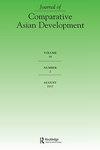台湾新竹科技产业园经济成功的背后:新自由主义治理下的分区技术、持续的原始积累与当地人的反抗
Q3 Social Sciences
引用次数: 5
摘要
摘要本文以当地社区对新竹科技产业园的抵制为焦点,提出台湾高科技发展项目不应被理解为反对新自由主义的东西,而应被理解为新自由主义全球化的一部分。此外,本文认为,无论是有效的国家干预,还是高科技企业之间的网络,都不足以解释台湾高科技与资本主义的发展。这种发展也不能被解释为这两个因素共同作用的结果。相反,它是新自由主义治理下的分区技术和持续的原始积累过程的结果。虽然这种高科技发展有利于高科技资本和活跃在该领域的专业人员,但它暂停或限制了那些被视为低市场价值和缺乏全球竞争力的公民的权利。本文章由计算机程序翻译,如有差异,请以英文原文为准。
Behind the Economic Success of Taiwan's Hsinchu Science Industrial Park: Zoning Technologies under Neo-liberal Governmentality, Ongoing Primitive Accumulation, and Locals’ Resistance
Abstract Focusing on local communities’ resistance to Hsinchu Science Industrial Park, this paper suggests that high-tech development projects in Taiwan should not be understood as something that stands in opposition to neo-liberalism, but as part of neo-liberal globalization. Moreover, this paper argues that neither the effective state intervention nor networks among high-tech firms are adequate to explain Taiwan's high-tech and capitalist development. Nor can this development be interpreted as an outcome of a combination of these two factors. Instead, it is an outcome of zoning technologies under neo-liberal governmentality and ongoing processes of primitive accumulation. While this high-tech development benefits high-tech capital and professionals active in that field, it suspends or curtails the rights of those citizens who are seen to have a low market value and lack global competiveness.
求助全文
通过发布文献求助,成功后即可免费获取论文全文。
去求助
来源期刊

Journal of Comparative Asian Development
Social Sciences-Political Science and International Relations
CiteScore
1.30
自引率
0.00%
发文量
2
期刊介绍:
The Journal of Comparative Asian Development (JCAD) aims to offer the most up-to-date research, analyses, and findings on the many aspects of social, economic, and political development in contemporary Asia conducted by scholars and experts from Asia and around the world.
 求助内容:
求助内容: 应助结果提醒方式:
应助结果提醒方式:


